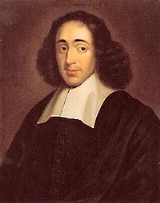
Baruch Spinoza
Overview
Baruch de Spinoza and later Benedict de Spinoza (in all mentioned languages the given name means "the Blessed") (November 24, 1632 – February 21, 1677) was a Dutch
Jewish
philosopher. Revealing considerable scientific aptitude, the breadth and importance of Spinoza's work was not fully realized until years after his death. By laying the groundwork for the 18th century Enlightenment
and modern biblical criticism
, he came to be considered one of the great rationalists
of the 17th-century philosophy
.
Netherlands
The Netherlands is a constituent country of the Kingdom of the Netherlands, located mainly in North-West Europe and with several islands in the Caribbean. Mainland Netherlands borders the North Sea to the north and west, Belgium to the south, and Germany to the east, and shares maritime borders...
Jewish
Judaism
Judaism ) is the "religion, philosophy, and way of life" of the Jewish people...
philosopher. Revealing considerable scientific aptitude, the breadth and importance of Spinoza's work was not fully realized until years after his death. By laying the groundwork for the 18th century Enlightenment
Age of Enlightenment
The Age of Enlightenment was an elite cultural movement of intellectuals in 18th century Europe that sought to mobilize the power of reason in order to reform society and advance knowledge. It promoted intellectual interchange and opposed intolerance and abuses in church and state...
and modern biblical criticism
Biblical criticism
Biblical criticism is the scholarly "study and investigation of Biblical writings that seeks to make discerning judgments about these writings." It asks when and where a particular text originated; how, why, by whom, for whom, and in what circumstances it was produced; what influences were at work...
, he came to be considered one of the great rationalists
Rationalism
In epistemology and in its modern sense, rationalism is "any view appealing to reason as a source of knowledge or justification" . In more technical terms, it is a method or a theory "in which the criterion of the truth is not sensory but intellectual and deductive"...
of the 17th-century philosophy
17th-century philosophy
17th-century philosophy in the Western world is generally regarded as being the start of modern philosophy, and a departure from the medieval approach, especially Scholasticism....
.
Discussions
Quotations
Nature is satisfied with little; and if she is, I am also.![]()
As quoted in The Story of Philosophy (1933) by Will Durant, p. 176
:s:On the Improvement of the Understanding|Tractatus de Intellectus Emendatione [On the Improvement of the Understanding] (1662) Full text online
As men's habits of mind differ, so that some more readily embrace one form of faith, some another, for what moves one to pray may move another to scoff, I conclude ... that everyone should be free to choose for himself the foundations of his creed, and that faith should be judged only by its fruits; each would then obey God freely with his whole heart, while nothing would be publicly honoured save justice and charity.![]()
Preface

